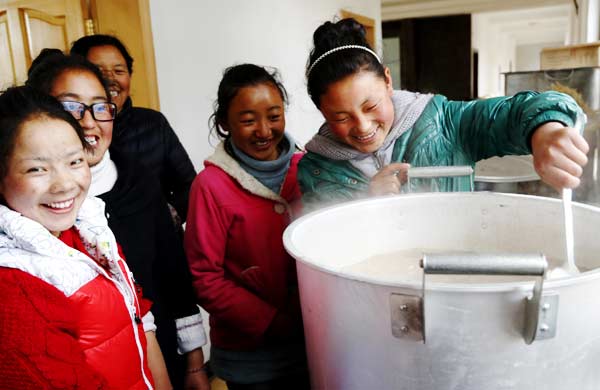Lhasa orphans mark Tibetan New Year with noodle feast
Updated: 2014-03-03 09:28
By Palden Nyima and Daqiong in Lhasa (China Daily)
|
|||||||||||
 |
|
A girl cooks guthuk at the Gyalzur Tendol Orphanage in Doilungdeqen county, Lhasa, the Tibet autonomous region, on Friday. [Photo by Palden Nyima / China Daily] |
Auspicious greetings, barley wine, prayer flags, fireworks, and laughter filled the air in Lhasa on Sunday as Tibetans dressed in their best clothes to embrace the Tibetan New Year, known locally as Losar.
According to the Tibetan calendar, this year is the year of the Male Wooden Horse, and it started on Friday, which was the 29th day of the 12th month on the Tibetan calendar.
In line with tradition, Tibetans celebrated on Friday evening by eating guthuk - ball-shaped noodles made from nine key ingredients, reflecting the number nine in the date.
While the noodles and the broth in which they are served are delicious enough, there is an added treat included in the meal. Enfolded into a few of the guthuk dough-balls are materials with a symbolic meaning, either good or bad.
Carefully cutting the balls open, diners may find a small ball of wool or a scrap of paper, which symbolizes some aspect of their character of their way of life. The balls are distributed randomly, making the process all the more mysterious.
The children of Gyalzur Tendol Orphanage in Lhasa's Doilungdeqen county were particularly excited by the festive occasion, especially the guthuk feast and its associated game of symbols.
Most of the 61 children who have made the orphanage the home were present for the occasion, returning from their temporary lodgings at schools or colleges.
"I got wool in my bowl of guthuk, which means I am a good-tempered person," said Tseyang, a Tibetan girl who still thinks of the orphanage as home, despite having moved away to study at the Tibet Medical College.
Among those helping to make the meal is Tsamjo, one of the two nurses at the orphanage. She has been working there for 21 years.
Related Stories
2014 Pingyao Chinese New Year earns 86 million yuan 2014-02-26 16:40
People make traditional food "Kasai" for Tibetan New Year 2014-02-26 09:16
A new year of learning begins 2014-02-18 11:48
Tibetan children in new year's costumes 2014-02-19 11:20
Today's Top News
War in Ukraine a long shot, experts say
Beijing-area air better than before
EU condemns China's terrorist attacks
Abe 'shut the door': spokesman
Putin not yet decided on use of force in Ukraine
28 dead in Kunming violence
China, UK hold dialogue on ties
Ukraine protests over airspace violation
Hot Topics
Lunar probe , China growth forecasts, Emission rules get tougher, China seen through 'colored lens', International board,
Editor's Picks

|

|

|

|

|

|







